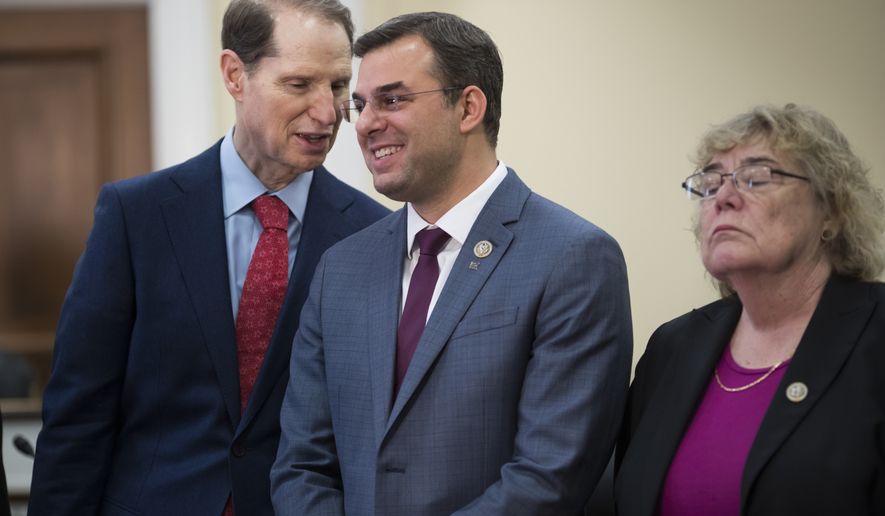Senators defeated a filibuster Tuesday and cleared the path for a full renewal of the government’s chief foreign intelligence-collection program, turning back a coalition of conservatives and liberals who’d tried to impose stiffer checks to protect Americans’ civil liberties.
The 60-38 vote sets up final passage as early as Wednesday, just ahead of a Friday deadline for renewing Section 702 of the Foreign Intelligence Surveillance Act.
The dramatic vote saw key lawmakers lobbied on the floor by both intelligence-community defenders and civil-liberties champions.
Sen. Claire McCaskill, Missouri Democrat, ended up casting the deciding 60th vote to surmount the filibuster after GOP leaders told her the snooping program could expire without quick Senate action.
Section “702 is the single most important national security tool that we have in the United States,” Sen. Richard Burr, North Carolina Republican and chairman of the intelligence committee, said as he pushed colleagues to embrace the controversial law.
The section most in dispute is aimed at collecting contents of phone calls, emails and other communications of foreign targets overseas — though Americans talking with those foreign targets can have their communications scooped up.
The debate is over how the government can collect and use information it gathers.
The bill GOP leaders are pushing would require a warrant to access information about Americans, but only after a criminal investigation unrelated to national security is established. It would reauthorize the surveillance authority for six years.
Civil liberties advocates had pushed for a shorter renewal and wanted expanded warrant requirements, saying they feared federal investigators will easily find ways to circumvent the intent of the law and could even use the snooping powers to target minorities unfairly.
The critics of Section 702 had said if they were successful in their filibuster they could offer amendments to create more protections for Americans.
They lobbied Ms. McCaskill and Sen. John Kennedy, Louisiana Republican, who were the final holdouts. If either had backed the filibuster it could have forced GOP leaders to negotiate on changes.
One group of 702 critics, including Republican Sens. Rand Paul of Kentucky, Ted Cruz of Texas and Mike Lee of Utah, along with Democratic Sens. Ron Wyden of Oregon and Patrick Leahy of Vermont, told Mr. Kennedy that the bill would allow too many government searches without a warrant, and too many Americans’ data was being “unmasked” by the intelligence community.
Mr. Wyden, Oregon Democrat, said he and Dan Coats, the director of National Intelligence, have had disagreements over the quantity of domestic collections under Section 702.
“We could never get a straight answer. It was right out of George Orwell,” said Mr. Wyden, who opposed the bill without amendments.
“I think it’s just a surrender of our constitutional obligations, so when senators talk about oversight, I think people are going to say ‘where were you tonight?’”
FISA supporters, including Mr. Burr and Sen. John Cornyn, Texas Republican, also isolated Mr. Kennedy on the floor and told him fast action was needed.
The House already passed the 702 renewal last week, and it was unclear whether an amended bill could be sent back to the House and passed in time to meet Friday’s deadline.
“I can’t predict what the House will do,” Mr. Cornyn told Mr. Kennedy.
Ms. McCaskill was one of 19 members of the Democratic Caucus to vote for renewal. Eight Republicans voted against it.
Senate Majority Leader Mitch McConnell, Kentucky Republican, insisted the law is aimed at foreigners.
“Nor does it permit the targeting of anyone — of any nationality — who is known to be located here in the U.S. But with respect to foreigners on foreign soil, 702 gives the men and women who keep us safe a vital tool they need to fulfill their missions,” he said.
Mr. Paul, who spoke to President Trump about his concerns over the surveillance law last week, said he believes Mr. Trump would like to see amendments to the bill.
“I would suspect if he were here, he would be horrified by the notion that we would not have any alternatives presented to this bill,” Mr. Paul said at a press conference Tuesday.
• Alex Swoyer can be reached at aswoyer@washingtontimes.com.




Please read our comment policy before commenting.